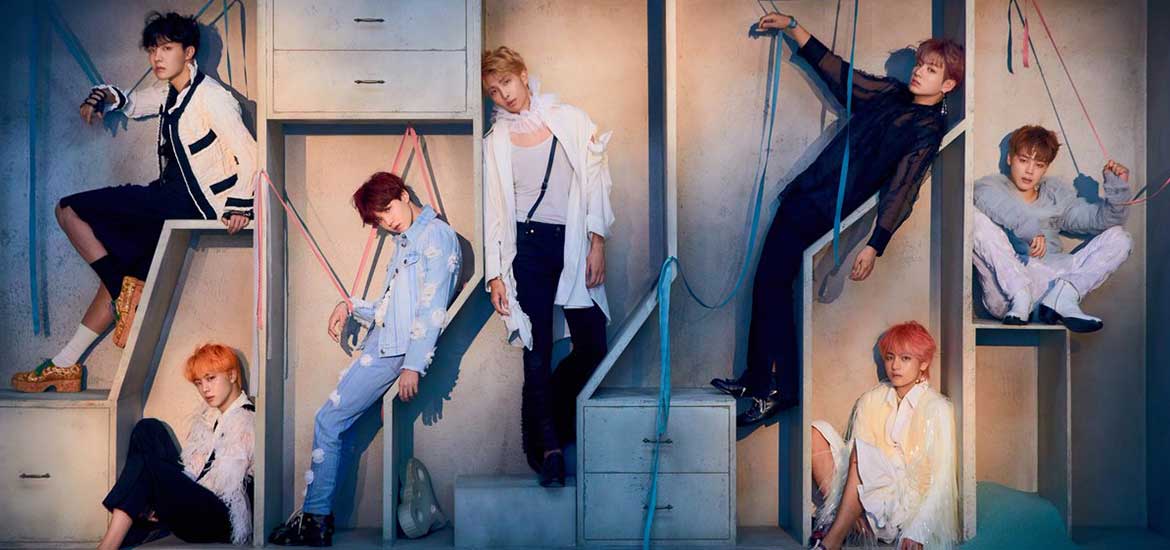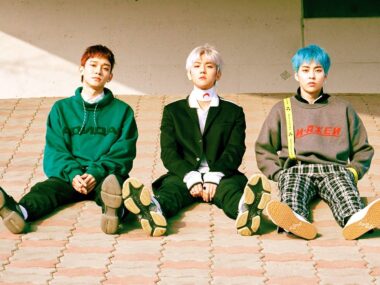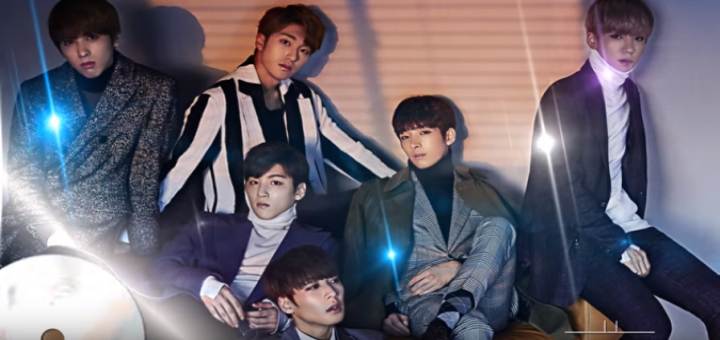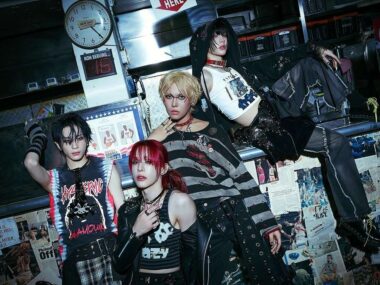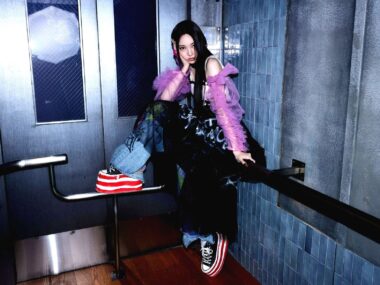BTS released the concept photos for their compilation album Love Yourself: Answer in four variations: S, E, L, and F. On the surface, the pictures are striking but if you look closer, a different pattern emerges. In Version S, the individual shots have the members monitored by surveillance cameras, or there are literal eyes watching them through the walls. In Version E, each member is trapped inside a glass bubble. Trapped beneath the gaze of an unseen audience.

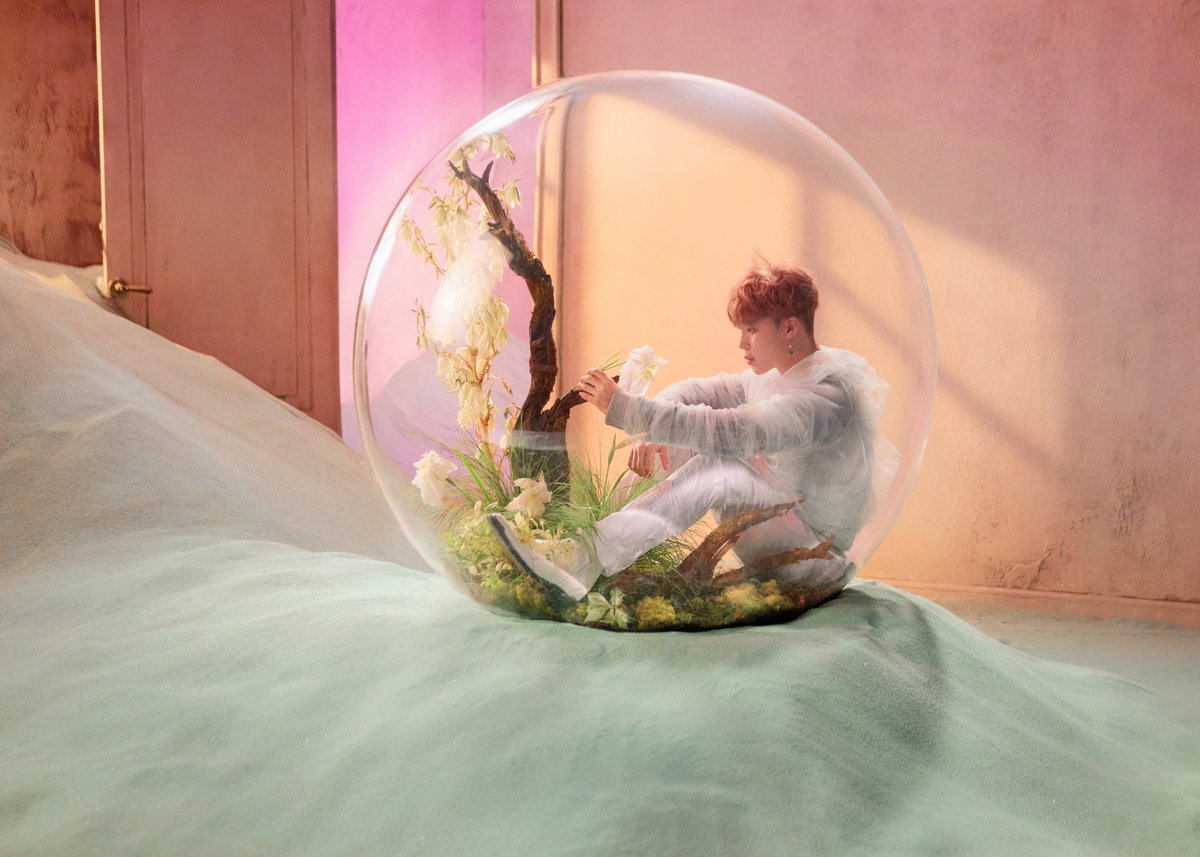
These images hit hard if you’ve been following BTS during the Love Yourself era. The message? When the world is always watching, it’s hard to know who you’re allowed to be.
So the question becomes: How do these concept photos reflect BTS’s relationship with fame, identity, and the growing weight of public expectations? Especially from within their own fandom?
The Performance of Identity
By 2018, BTS had already exploded globally. They weren’t just K-pop idols anymore. They were cultural icons, ambassadors and role models. Every move they made was scrutinized, whether it came from the industry, the media, or even their own fans.
The concept photos for Love Yourself: Answer seem to allude to that pressure and how burdensome it is. Versions S and E have a consistent theme of isolation, containment and exposure. There’s a haunting tension in the way BTS is presented, as if they’re always “on”.
It’s no coincidence. In interviews and documentaries like Burn the Stage, the members have discussed how carefully curated their public image is. They admitted to presenting fans with a “pretty package,” knowing that not everything they show is not the whole story. And yet, ARMYs are convinced they know BTS as intimately as the people in the group’s inner circle and they demand more. More access, more transparency. And when they don’t get it, criticism follows.
Constructive vs. Destructive Criticism
There’s nothing wrong with holding artists accountable. BTS themselves have spoken about listening to feedback and trying to grow. But there’s a difference between constructive criticism and destructive obsession.
Constructive criticism is thoughtful. It’s grounded in facts, not speculation. It focuses on specific actions and offers suggestions for change. Importantly, it respects the humanity of the person being critiqued and it’s not repeated endlessly.
Destructive criticism, on the other hand, often comes from frustration, entitlement, or emotional projection. It’s repetitive, emotionally charged, and usually built on assumptions. And in the world of fandom, it can quickly cross the line into control.
When fans constantly pick apart every decision BTS or BIGHIT MUSIC makes, they’re not just voicing concerns. They’re placing the burden of their expectations onto someone else’s shoulders. In a different context, that would be called emotional manipulation. There’s a difference between voicing genuine concern and being entitled. But it’s a fine line fans cross often.
The Fandom Mirror
The relationship between fans and idols gets even trickier when you think about how parasocial it can be. Sometimes, it’s hard to tell where genuine support ends and constant monitoring begins. A lot of fans say they’re just being “critical thinkers,” but that can turn into overanalyzing every little thing. Some even make up stories about the idols’ personal lives or intentions, and then criticize anyone who doesn’t see things the same way.
It turns into a cycle: the more fans push for answers or attention, the more the artist pulls back. And as the artist becomes more private, those same fans can start to feel let down or even betrayed.
At that point, it’s not really about wanting better music or content anymore. It’s about control. It’s about feeling entitled to every aspect of a celebrity’s life, and punishing them for not fitting into those expectations.
The MJ Tribute and the Right to Choose
A good example of this happened during BTS’s 2017 Muster, when Jimin and Jungkook performed a special tribute to Michael Jackson. The performance was never officially released online, and a lot of fans were upset. Some blamed BIGHIT for not sharing it, while others complained about poor planning or unfair decisions.
But what many people overlook is that tributes like this often come with tricky legal issues. Not every performance can be saved and posted online for everyone to see. And maybe Jimin and Jungkook just wanted to create a unique moment for the fans who were there; something special that would only exist in that time and place.
Instead of appreciating the artistry and understanding the limitations, some fans just got louder with their complaints. They treated the missing performance like a broken promise, instead of a special gift. It’s a reaction we’ve seen before, and it says more about the need for control than about the quality of what was shared.
The Cost of Being Watched
Fame isn’t just a spotlight; it’s also a magnifying glass. For BTS, that spotlight gets brighter and heavier every year. When fans constantly criticize, question every decision, and blur the lines between fantasy and reality, it slowly takes away the joy of creating.
The Love Yourself: Answer concept photos quietly ask us: Who really gets to decide how BTS is seen? And what does it cost them to show us these different sides of themselves?
At the end of the day, BTS isn’t just a brand. They’re seven real people, trying to live up to huge expectations with very little breathing room. If we truly want to support them, we have to let go of our sense of ownership and the idea that we know them better than they know themselves.
Because real love starts with understanding. And understanding begins when we step back and really listen.
📌 Changelog
- June 7, 2025: Rewrote the article to include additional information. Changed image.
- August 16, 2018: Date article was originally published.
